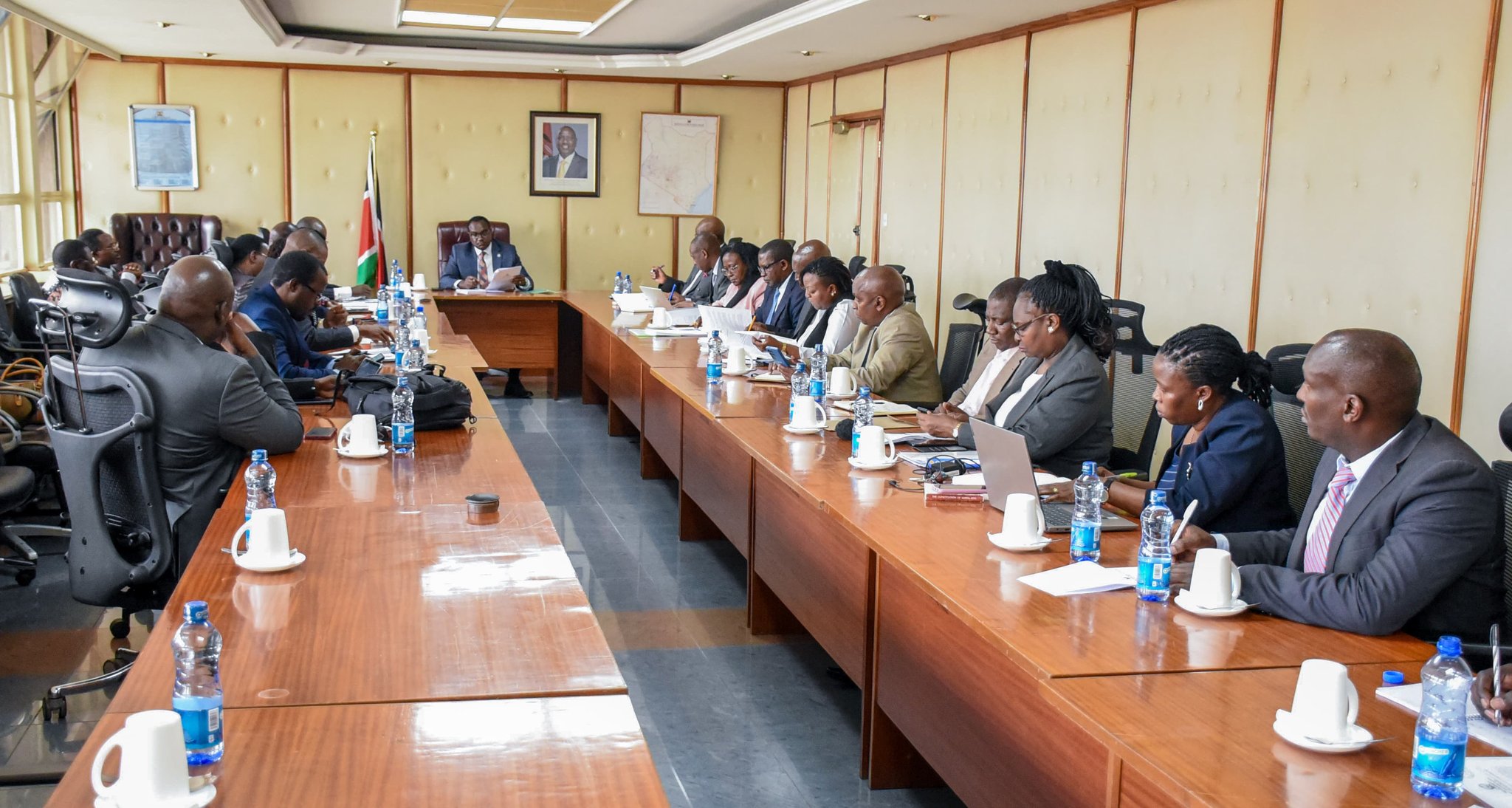
 Education CS Julius Ogamba chairs a consultative meeting with the Council and management of Moi University and the National Executive of the Universities Academic Staff Union at the Ministry’s Jogoo House B offices, September 4, 2025. /EDUMIN
Education CS Julius Ogamba chairs a consultative meeting with the Council and management of Moi University and the National Executive of the Universities Academic Staff Union at the Ministry’s Jogoo House B offices, September 4, 2025. /EDUMIN
Education CS Julius Ogamba has stepped in to avert further crisis at Moi University where lecturers’ strike is in its third week over pay issues.
The move comes after the dons vowed to stay away from lecture halls until their demands are met, further compounding an already sorry state of affairs at the cash-strapped institution.
Although students reported back earlier in the semester, learning has ground to a halt as lecturers press for the implementation of 25 demands contained in their strike notice.
At the heart of the protest are delayed June and July salaries, which the Universities Academic Staff Union (Uasu) insists must be paid at the 2021–2025 Collective Bargaining Agreement rates.
The lecturers also want the full implementation of the Return-to-Work Formula signed with the university council on November 30, 2024.
Among the key sticking points is the payment of Sh9 billion in salary arrears and statutory deductions, including Sh5 billion owed to the lecturers’ pension scheme.
For many staff members, the prolonged non-remittance of pensions has left deep uncertainty over their retirement security.
With more than 1,000 Uasu members at Moi University, the strike has paralysed teaching and cast a shadow over the institution’s ability to deliver on its academic mandate.
Last week, efforts to resolve the standoff collapsed after the union dismissed the university’s offer, describing it as inadequate.
Uasu also accused the administration of intimidation, claiming that lecturers were threatened with dismissal should they fail to resume duty.
““We wonder what image we are giving to young people who see their lecturers suffering without dignity. How do we inspire them to work hard when they can see our plight?” posed union vice chair Linda Khaemba, accusing the university of consistently violating agreements with its workers.
Moi University Vice Chancellor Prof Kiplagat Kotut acknowledged the challenges and insisted that management remains committed to talks.
He urged patience, saying dialogue was the only path to a durable solution.
The paralysis has left students frustrated and anxious, with many complaining that their academic programmes are hanging in the balance.
Student leaders have called on the Ministry of Education to intervene urgently.
“We are back in hostels, but there are no classes to attend. The government must intervene,” said one of the leaders, underscoring the sense of helplessness across the university community.
It is against this backdrop that CS Ogamba convened a high-level consultative meeting on Thursday at Jogoo House B in Nairobi.
The gathering brought together the Moi University Council and management, alongside the national leadership of Uasu, led by Secretary General Constantine Wasonga.
This was the first serious attempt to revive dialogue since last week's collapse of talks.
“The meeting reviewed the progress that has been in the implementation of the Return to Work Formula that was signed to end industrial action last year,” Ogamba said afterwards.
He stressed that restoring calm in institutions of higher learning was not just urgent but also essential to their long-term viability.
“Industrial harmony is vital for seamless teaching and learning in the country’s institutions of higher education,” the CS noted.
“Seamless operations, on the other hand, are essential in keeping institutions attractive to new students and productive partnerships, both key for sustainability.”
Though the meeting did not yield an immediate breakthrough, it has injected a sense of cautious optimism.
On the face of it, the ministry appears keen to craft a compromise that would see lecturers resume duty without undermining the financial survival of the institution.
For now, the deadlock persists. Lecturers remain defiant, students remain stranded, and the administration remains under pressure.
Ogamba's intervention has injected fresh hope that consensus could be reached and renewed sense that dialogue, rather than brinkmanship, may finally light the path to restoring learning at Moi University.












